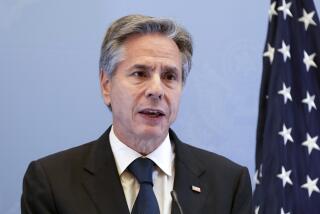U.S. Plans to Pass Hat for Gulf Again : Military costs: Raising new money abroad could prove critical in maintaining the multinational force. Japan may be a particular problem.
- Share via
WASHINGTON — The Bush Administration is planning to start passing the tin cup overseas once again, seeking a new round of financial contributions from foreign governments to help pay for the mounting costs of the U.S. troop deployment in the Persian Gulf, Administration sources said this week.
The ability to raise new money abroad could prove critical in determining whether the Administration can maintain the multinational coalition in the gulf over a long period of time while giving the embargo against Iraq time to work. Some members of Congress and a number of foreign leaders have urged such a long-term strategy as an alternative to war.
One Administration official said that foreign governments will be asked by early next year to help pay for “sustainment”--that is, the monthly expenses needed to keep the multinational forces operating.
“We will go back to all the countries and say: ‘OK, now we have a better fix on how much this is going to cost us a month to maintain this presence,’ ” said one Administration official. “Obviously, the big players are going to be the Saudis, the Kuwaitis and the Japanese.”
The new round of American fund raising is likely to touch off a particularly strong political reaction in Japan, where the government of Prime Minister Toshiki Kaifu has confronted domestic criticism even for the $4-billion contribution it made last September. A senior budget official at Japan’s Ministry of Finance told The Times last week that he is worried about the possibility of new U.S. demands for money.
“The Japanese government has announced that this ($4 billion) is going to be the contribution Japan is making,” an official at the Japanese Embassy in Washington said this week. “At this moment, the Japanese government has no intention of increasing this amount.”
A spokesman for Saudi Arabia’s embassy in Washington said that he will decline to answer any questions concerning Saudi financial contributions. Kuwaiti officials could not be reached for comment.
In September, after the initial American deployment, Pentagon officials estimated that the gulf operations would cost the United States about $1.5 billion a month.
During the Administration’s initial efforts last September, the biggest sums of money were volunteered by Saudi Arabia, which promised as much as $10 billion; Kuwait, $5 billion; Japan, $4 billion, and Germany, slightly over $2 billion.
Most of the countries pledging money for the international effort against Iraq have divided their contributions into two parts: generally half for the deployment of U.S. and other forces in the Persian Gulf, and the remainder to help the countries most affected by Iraq’s invasion, such as Egypt, Jordan and Turkey.
There is no indication yet as to exactly how much more money the Administration will seek or how many countries will be asked to contribute. U.S. officials have declined to make public revised estimates of the costs of gulf operations since President Bush announced plans earlier this month to deploy more than 200,000 additional U.S. troops.
“There’s been a general assumption that as our troop presence grows, we will have to collect more money,” acknowledged one Bush Administration official.
But he and others in the Administration say that the new U.S. deployment--aimed at enabling the forces to take offensive action against Iraq--is only one of the reasons for seeking new money.
Another factor is the prolonged time period for the gulf operations. The funds raised last September in trips abroad by Secretary of State James A. Baker III and Treasury Secretary Nicholas F. Brady were supposed to help cover the costs of gulf operations only through the end of 1990.
“We, in a general way, gave them the word when we went the first time,” said another U.S. official. “We indicated this was the initial increment we were going to ask for but that, if this thing should drag on longer than we hoped, we’d be back.”
Recently, during a visit to Tokyo, Vice President Dan Quayle suggested to Japanese officials that the Administration would be making new requests for money. One U.S. official said that “a lot of groundwork was laid” during Quayle’s trip for a second round of American fund raising.
Throughout the fall, some Administration officials have grumbled about delays in receiving the money promised by several of the countries, including Japan. On Sept. 29, after Bush met in New York City with Kaifu, an Administration official said that the President had urged Japan to make “timely” payment of its pledged $4 billion.
“It was tough getting that first money disbursed (by Japan) for our forces,” said one U.S. official.
Japan has so far contributed close to $1 billion to the United States, about half of the money it has promised for the multinational forces. Japanese officials have promised to get legislative approval for the other $1 billion next month.
“It (the first contribution from Japan) is in our account, and we’re spending it,” said one Administration official. “There are a lot of promises out there, but the Japanese have been most forthcoming in putting real cash and real in-kind assistance on the line, in large amounts.”
Last week, Rep. Les Aspin (D-Wis.) complained that a $600-million block of money Japan provided to Egypt, Turkey and Jordan had been in the form of “loans rather than grants.” He also said that Japan was trying to ensure that this money is used for the purchase of Japanese products.
Administration officials emphasized that Japan has imposed no such restrictions on Japan’s contributions to Operation Desert Shield.
“The Japanese are very flexible with us,” said one U.S. official. “. . . There are some obvious restrictions. They don’t want us to go out and buy tanks. (But) we could spend all of the money in the United States, if that’s the best place to do it.”
Foreign governments do not give their money directly to the United States. Instead, they contribute to a special fund managed by the Gulf Cooperation Council, composed of Arab nations, which then passes on the money to cover American expenses.
More to Read
Sign up for Essential California
The most important California stories and recommendations in your inbox every morning.
You may occasionally receive promotional content from the Los Angeles Times.










